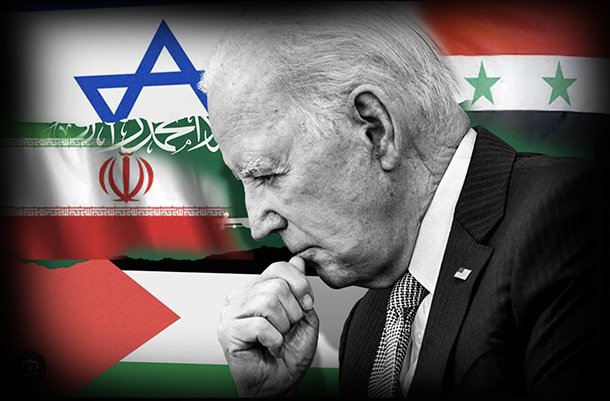The U.S. have created too many enemies in the region, and there is no viable path forward that would legitimise their aggressive posture.
This is exactly where the United States is in the Middle East right now…

MK Bhadrakumar from The Cradle writes…
Deterrence in defense is a military strategy where one power uses the threat of reprisal to preclude attack from an adversary, while maintaining at the same time the freedom of action and flexibility to respond to the full spectrum of challenges. In this realm, the Lebanese resistance, Hezbollah, is an outstanding example.
Hezbollah’s clarity of purpose in establishing and strictly maintaining ground rules that deter Israeli military aggression has set a high regional bar. Today, its West Asian allies have adopted similar strategies, which have multiplied in the context of the war in Gaza.
America, surrounded
While the Yemeni resistance movement Ansarallah is comparable to Hezbollah in certain respects, it is the audacious brand of defensive deterrence practiced by the Islamic Resistance of Iraq that is going to be highly consequential in the near term.
Last week, citing sources in the State Department and Pentagon, Foreign Policy magazine wrote that the White House is no longer interested in continuing the US military mission in Syria. The White House later denied this information, but the report is gaining ground.
The Turkish daily Hurriyet wrote on Friday that while Ankara is taking a cautious approach to media reports, it does see “a general striving” by Washington to exit not only Syria but the entire region of West Asia, as it senses that it has been dragged into a quagmire by Israel and Iran from the Red Sea to Pakistan.
Russia’s special presidential representative for the Syrian settlement, Alexander Lavrentiev, also told Tass on Friday that much depends on any “threat of physical impact” on American forces present in Syria. The swift US military exit from Afghanistan took place with virtually no advance notice, in coordination with the Taliban. “In all likelihood, the same may happen in Iraq and Syria,” Lavrentiev said.
Indeed, the Islamic Resistance of Iraq has stepped up its attacks on US military bases and targets. In a ballistic missile attack on Ain al-Asad airbase in western Iraq a week ago, an unknown number of American troops sustained injuries, and the White House announced its first troop deaths on Sunday when three US servicemen were killed on the Syrian-Jordanian border in strikes earlier that day.
Calling Beijing for help
This situation is untenable for President Joe Biden politically — in his re-election bid next November — which explains the urgency of the National Security Adviser Jake Sullivan’s meeting with Chinese Foreign Minister Wang Yi on Friday and Saturday in Thailand to discuss the Ansarallah attacks in the Red Sea.
US National Security Council spokesman John Kirby explained Washington’s rush for Chinese mediation thus:
“China has influence over Tehran; they have influence in Iran. And they have the ability to have conversations with Iranian leaders that — that we can’t. What we’ve said repeatedly is: We would welcome a constructive role by China, using the influence and the access that we know they have…”
This is a dramatic turn of events. While the US has long been concerned about China’s growing sway in West Asia, it also needs that influence now as Washington’s efforts to reduce violence are getting nowhere. The US narrative on this will be that the “strategic, thoughtful conversation” between Sullivan and Wang will not only be “an important way to manage competition and tensions [between the US and China] responsibly” but also “set the direction of the relationship” on the whole.
Meanwhile, there has been hectic diplomatic traffic between Tehran, Ankara, and Moscow, as Iranian President Ebrahim Raisi traveled to Turkiye, and the moribund Astana format on Syria last week got kickstarted. Succinctly put, the three countries anticipate a “post-American” situation arising soon in Syria.
A US exit from Syria and Iraq?
Of course, the security dimensions are always tricky. On Friday, Syrian President Bashar al-Assad chaired a meeting in Damascus for commanders of the security apparatus in the army to formulate a plan for what lies ahead. A statement said the meeting drew up a comprehensive security roadmap that “aligns with strategic visions” to address international, regional, and domestic challenges and risks.
Certainly, what gives impetus to all this is the announcement in Washington and Baghdad on Thursday that the US and Iraq have agreed to start talks on the future of American military presence in Iraq with the aim of setting a timetable for a phased withdrawal of troops…
Continue this analysis at The Cradle
READ MORE SYRIA NEWS AT: 21st CENTURY WIRE SYRIA FILES
ALSO JOIN OUR TELEGRAM CHANNEL
SUPPORT OUR INDEPENDENT MEDIA PLATFORM – BECOME A MEMBER @21WIRE.TV
















